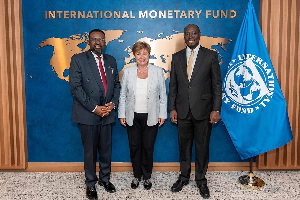The Corporate Affairs Department of the National Pensions Regulatory Authority (NPRA) has announced that about nine million people working in the country’s informal sector without any form of pension scheme risk slumping into retirement income insecurity.
The NPRA says between the next five and 10 years, such working individuals will retire poor and become a liability to their families and society if the situation is not addressed.
The picture being painted by the NPRA is a serious one but we wonder what can be done for such people to enjoy in the future, considering their ages, which by inference can be put at 50 to 55 years.
Our concerns about the matter are based first on historical evidence that Ghana introduced its semblance of the Social Security pension scheme in 1965 and that was a Provident Fund (PF) Scheme under which lump sums were paid to qualified members without monthly payments.
It was intended to operate as a PF for five years (1965 to 1970) and thereafter be converted into a pension scheme for periodic monthly payments.
Even under this PF scheme, some workers became paupers because the PF payment was not enough for any meaningful undertaking to support their retirement life.
In 1972, the NRCD 127 established the Social Security and National Insurance Trust (SSNIT), which subsequently converted the fund to a pension scheme.
Under that new scheme, contributors were supposed to make a minimum contribution of 240 months (20 years) to qualify for Superannuation Pension/ Old age Pension.
There were also Invalidity Pensions, Survivor’s Lump sum, and Emigration benefits.
Currently, the reformed scheme has all the benefits but demands that contributors should do 180 months’ (15 years’) contributions to earn the Superannuation Pension/ Old age Pension, with the other benefits having their guidelines just as was the case under previous arrangements.
Though there are various pension arrangements besides the monthly payments from SSNIT, we are forced to ask what can be done for people aged even 47 years to qualify for a pension, let alone those who are 50 and above.
We, however, know that if a contributor does not qualify for Old Age Pension when he retires either compulsorily or voluntarily, his total contributions will be refunded with interest to him.
Sometimes, this also creates some of the PF hardships
Considering the age and contribution thresholds in pension arrangements, we wonder what the NPRA can do for the ‘over-age’ workers in the informal sector to secure any pension.
Maybe, we are getting the NPRA wrong because we see it as not having articulated its points well enough for us to make meaning out of it.
Therefore, we appeal to the NPRA to come again, but this time with what is convincing.
We think with evidence of retired workers suffering from hardships due to low pension payments or none at all, the NPRA conversation is useful despite some gaps in its communication.
It is the time to educate informal-sector workers to patronize pension schemes and even for formal-sector workers also to look elsewhere in addition to the SSNIT arrangement to secure good income while on retirement.
Editorial News of Wednesday, 4 October 2023
Source: ghanaiantimes.com.gh













